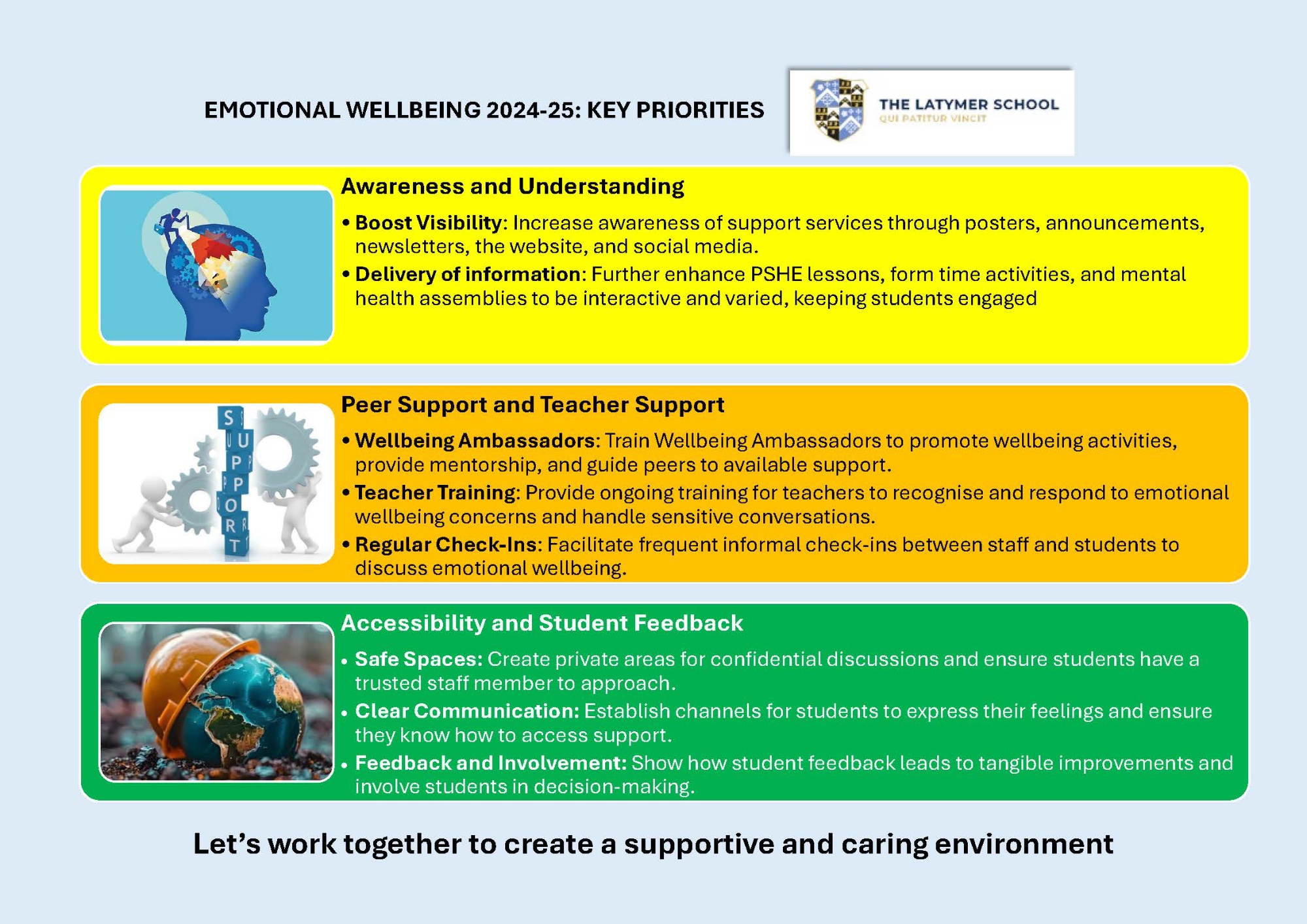Emotional wellbeing
Emotional wellbeing and mental health at the Latymer School
At The Latymer School, we are deeply committed to fostering a culture of positive emotional wellbeing and mental wellness among our students and staff. We believe that promoting good mental health is essential to ensuring that every student feels content and secure within themselves, allowing them to truly flourish during their time with us. By cultivating emotional wellbeing, we enable our students to navigate life’s challenges, achieve their academic and personal potential, and contribute meaningfully to both the school and the wider community.
Whole-school approach
Our whole-school approach to emotional wellbeing involves every member of our school community, including students, parents, teachers, and support staff, in actively contributing to a supportive and inclusive environment. By prioritising mental health, we establish a foundation where effective teaching and learning can thrive, and each individual feels they belong and are valued. This strategic leadership across the school creates supportive systems, ensuring that practical strategies for emotional health become part of our everyday practices.
Pastoral programme
Our pastoral programme is integral to supporting the emotional and social development of our students. It includes:
- Whole school assemblies: These assemblies are designed to bring the entire school community together to discuss key themes related to emotional wellbeing, celebrate achievements, and reinforce our school values.
- Year assemblies: Tailored to the specific needs and experiences of each year group, these assemblies provide an opportunity to address age-relevant topics and support students in their personal development journey.
- Form time activities: Daily form time activities are structured to build relationships, promote self-awareness, and support students in managing their emotions. These activities are led by form tutors who play a key role in the pastoral care of students.
Pastoral support team
Our dedicated pastoral support team includes:
- Heads of Learning and Assistant Heads of Learning: these leaders coordinate pastoral care within their respective year groups, ensuring that all students receive the support they need.
- Pastoral Support Officers: they provide targeted support and guidance to students, working closely with families and external agencies when necessary.
- Form Tutors: as the first point of contact for students, form tutors offer daily support and guidance, playing a crucial role in fostering positive relationships and monitoring student wellbeing.
- School Counsellors: our two experienced school counsellors offer professional mental health support to students who need it, providing a safe and confidential space for students to explore their feelings and concerns.
Partnerships and support
We work in partnership with our local community and health services to provide robust support for our students when needed, creating clear pathways to access mental health services. These partnerships ensure that our students have access to the necessary resources and support, enhancing their ability to manage their emotional wellbeing effectively.
Curriculum and early intervention
Building resilience and strengthening emotional wellbeing are crucial to supporting our young people in realising their potential. Early intervention is key, and we focus on identifying potential issues early on and providing preventative support. Through personal, social, and health education (PSHE) and relationships and sex education (RSE), our curriculum is designed to give students the tools they need to build resilience, manage their emotions, and develop essential life skills.
These lessons, embedded throughout the curriculum, allow our students to engage with topics around mental health, safety, and wellbeing in a structured, supportive manner, helping to normalise conversations about mental health and reduce stigma.
Developing social and emotional skills
Social and emotional skills, such as resilience, self-awareness, and relationship-building, are vital life skills that enhance our students’ academic performance and motivation. These skills are taught and reinforced in various ways, from high-quality lessons to targeted programmes and interventions. We are committed to equipping our students with the coping strategies needed to thrive both academically and personally, ensuring that their time at The Latymer School is marked not only by achievement but also by a strong foundation for lifelong wellbeing.
Through this comprehensive approach to emotional wellbeing, The Latymer School aims to support every student in becoming a well-rounded individual, prepared to face the future with confidence and resilience.
OUR Vision Statement: empowered to thrive
Our school is committed to providing a healthy and caring environment that promotes and supports positive mental health for our students, staff, and parents/carers. Recognising the profound link between emotional wellbeing, progress, and attainment, we are dedicated to fostering an environment where every member of our community feels supported, valued, and empowered.
By considering student and staff wellbeing in all aspects of school life, we create a positive, healthy environment that enhances student engagement, performance, and achievement, enabling everyone to develop and reach their full potential.
We embrace a whole-school approach, ensuring excellent support, understanding, and intervention for all individuals to maintain their positive wellbeing and mental health.
- Promoting awareness: mental health is a visible and integral part of daily school life, with everyone understanding its importance.
- Early intervention: we proactively identify and address mental health issues, providing timely and appropriate support.
- Inclusive support: our initiatives meet the diverse needs of our community, ensuring access to necessary resources and interventions.
- Building resilience: we help our students understand their emotions, build self-esteem, develop resilience, and navigate challenges.
- Engaging the community: we actively involve parents, pupils, and staff in open conversations about emotional wellbeing, fostering a culture of transparency and mutual support.
By embedding these principles in our policies, practices, and daily interactions, we ensure that emotional wellbeing and mental health remain at the core of our school's mission and values. Our commitment guarantees that every member of our community feels supported, valued, and empowered to thrive.
Wellbeing Award for Schools
We are excited to announce that The Latymer School has signed up to the Wellbeing Award for Schools, developed by Optimus Education in partnership with the National Children’s Bureau (NCB). This award focuses on strengthening our commitment to mental health and emotional wellbeing for both students and staff, embedding it within the school’s culture and making it a priority in every aspect of school life.

Our commitment to wellbeing
The Wellbeing Award is an opportunity for us to deepen our practices around mental health, ensuring that emotional wellbeing is seen as a shared responsibility among all members of our community. To achieve the award, we will demonstrate how we prioritise mental health as an integral part of school life, from early identification of issues to tailored support that meets the specific needs of our students and staff.
Whole-school involvement
The award process requires us to engage the whole school community - including students, staff and parents - in recognising the importance of mental health. We will gather their views and use their insights to shape our approach, ensuring that our strategies are inclusive and reflective of the diverse perspectives within our school.
Evaluation objectives
We will be evaluated on eight key objectives that encompass our overall commitment, efforts to promote wellbeing, and the effectiveness of our curricular and pastoral provisions. This includes gathering feedback from students and a sample of parents to ensure our approach is comprehensive and responsive to the needs of our community.
Building on our strengths
By pursuing the Wellbeing Award, we aim to continue building on our strengths in mental health provision and to further enhance our practices where needed. This award will not only recognise the excellent work already in place but also drive further development to ensure Latymer remains a place where everyone can flourish.
Through this initiative, we reaffirm our dedication to fostering an environment where emotional wellbeing is at the forefront, enabling our students and staff to thrive both academically and personally. We are excited about the journey ahead and look forward to the positive impact this will have on our school community.
ParentS/Carers' Role in Promoting Emotional Wellbeing & Mental Health within the school
|
1. Open communication and collaboration
|
|
|
2. Education and awareness
|
|
|
3. Support school initiatives & involvement
|
|
|
4. Model healthy behaviours and build resilience
|
|
|
5. Recognise and address stress
|
|
|
6. Create a supportive home environment
|
|
|
7. Trust the school’s decisions and actions (emotional wellbeing and behaviour)
|
|
|
8. Maintain a positive relationship between home and school
|
|
|
9. Model positive relationships with other parents and carers
|
|
By incorporating these strategies, parents and carers can help foster a supportive, emotionally healthy environment that nurtures both the academic and personal growth of their child/young person. This partnership between home and school is crucial for promoting long-term mental wellbeing and academic success for all students.
Supporting Your Child’s Emotional Wellbeing
This section is designed to provide parents, carers, and guardians with practical advice, resources, and support to help children and young people navigate emotional challenges. We have included information drawn from trusted sources such as the NHS and mental health charities including Place2Be, YoungMinds, and the Charlie Waller Trust.
 Understanding the challenges
Understanding the challenges
The past few years have brought unique pressures for families, including the COVID-19 pandemic, social changes, and academic expectations. These challenges can impact children and young people in different ways, such as:
- Feeling anxious or upset about school, friendships, or family situations.
- Struggling to cope with change, loss, or uncertainty.
- Experiencing low self-esteem, withdrawal, or changes in behaviour.
It is important to acknowledge that while many children manage with the support of family and friends, some may need additional help to address persistent difficulties affecting their daily lives.
 Ten practical tips for supporting a child or young person with their emotional wellbeing and mental health
Ten practical tips for supporting a child or young person with their emotional wellbeing and mental health
Supporting a child or young person with their emotional wellbeing can be challenging, but small, meaningful steps can make a big difference. Here are ten practical tips to help:
- Accept and understand their feelings
Acknowledge their emotions without judgement. Take the time to educate yourself about their struggles and validate their feelings with phrases like, “It’s okay to feel this way.” - Create a safe space to talk
Encourage open conversations by providing a calm, non-judgemental environment. Listen without interrupting or dismissing their concerns to help them feel heard and valued. - Establish structure and routine
Consistent routines around sleep, meals, and activities provide stability and a sense of security, especially during uncertain times. - Incorporate positive activities
Engage in activities that promote mental wellbeing, such as walks, creative arts, or hobbies your child enjoys. These can serve as healthy distractions and opportunities to connect. - Encourage healthy voping mechanisms
Support your child in finding positive ways to manage stress, such as practising mindfulness, talking to friends, or exploring hobbies. Encourage these practices regularly. - Watch for warning signs
Stay alert to changes in behaviour, such as withdrawal, mood swings, or frequent physical complaints like headaches. These could indicate a deeper issue that needs attention. - Seek professional support when needed
If symptoms persist or become severe, consult your child's GP or health visitor, and the school's pastoral support team: school pastoral leads (Senior Assistant Headteacher – Care, Guidance & Support, and Assistant Headteacher – Behaviour, Attendance & Enrichment); SENCO; Heads of Learning and Assistant Heads of Learning for each year group; the Sixth Form Emotional Wellbeing Officer; form tutors; two school counsellors; and pastoral support officers for KS3/KS4, and KS5. Local mental health services like CAMHS (Child and Adolescent Mental Health Services). - Create opportunities to connect
Spend quality time with your child doing things they enjoy. Shared activities like playing games, walking, or cooking together can build trust and encourage communication. - Look after yourself
Prioritise your mental health and wellbeing. When you’re well-supported and balanced, you’ll be better equipped to help your child navigate their challenges. - Hold on to hope
Stay optimistic, even during tough times. Remind your child that things can improve and that they’re not alone. Your belief in a brighter future can provide stability and reassurance.
These practical steps, rooted in the experiences of parents, carers, and experts, serve as a helpful guide. Remember, every child is unique, and it’s okay to take time to find what works best. Seek professional help if needed and approach the journey one step at a time.
When urgent help is needed
- If your child’s life is in immediate danger, call 999 or visit A&E.
- For urgent mental health advice, contact your local 24-hour mental health helpline or the NHS at 111.
 What to do if your child doesn’t want to talk
What to do if your child doesn’t want to talk
It can be difficult when your child doesn’t feel ready to open up, but there are ways to gently encourage communication:
- Reassure them: let your child know it’s okay if they don’t want to talk right now. Remind them that you’re always available when they’re ready. You could say things like “You can talk to me; I’m here for you.”; “It’s okay to talk to someone else if that feels easier.”
- Explore alternative communication: if talking feels too daunting for your child, suggest writing a letter, sending a text, or drawing how they feel. Sometimes expressing emotions in non-verbal ways can feel less overwhelming.
- Choose the right moment: observe their mood and pick a time when they seem calm and more open to interaction. Sometimes, forcing a conversation can cause them to withdraw further.
- Engage in shared activities: many children find it easier to talk when their focus is on a shared activity, such as going for a walk, cooking, or doing a creative task. These settings can create a more relaxed atmosphere for conversation.
- Be patient and observant: even if your child isn’t talking, pay attention to their behaviour and emotions. Look out for signs of distress, and gently remind them that you’re there to support them when they’re ready.
What to do if your child tells you they’re struggling
If your child opens up about their struggles, it’s essential to respond with care and compassion:
- Validate their feelings
Let them know their emotions are understandable and that it’s okay to feel the way they do. For example, say, “It makes sense that you’re feeling this way.” - Thank them for sharing
Acknowledge the courage it took for them to open up. Phrases like, “Thank you for telling me. I’m here for you,” can be reassuring. - Offer reassurance
Let your child know they are not alone and that you will work through this together. Emphasise that their feelings are temporary, and that support is available. - Ask how you can help
Rather than assuming what they need, ask questions like, “What would help you feel better?” or “Is there something I can do to support you right now?” - Explore the cause
Talk about what might be triggering their struggles. It could be related to school, friendships, or other changes in their life. Working together to identify causes can guide you in finding solutions. - Provide access to support
Share information about helplines, text services, or trusted adults they can turn to if they feel uncomfortable sharing with you. - Focus on listening, not fixing
Avoid trying to solve everything immediately. Sometimes, just being there and listening without judgement can be the most valuable form of support. - Know when to seek professional help
If their struggles seem severe or persistent, reach out to a GP or the school pastoral team: the school pastoral leads (Senior Assistant Headteacher – Care, Guidance & Support, and Assistant Headteacher – Behaviour, Attendance & Enrichment); SENCO; Heads of Learning and Assistant Heads of Learning for each year group; the Sixth Form Emotional Wellbeing Officer; form tutors; two school counsellors; and pastoral support officers for KS3 & KS4, and KS5). Early intervention can make a significant difference. - Follow up
After the initial conversation, check in regularly to show that you care and are thinking about them. - Avoid high-stress moments for serious discussions
Wait until your child is calm to address deeper concerns or seek solutions. Heightened emotions can make problem-solving more challenging.
Listening and responding with empathy can make a profound impact. Always remember that professional support is available if your child’s needs go beyond what you can manage at home.
 Take care of yourself
Take care of yourself
Looking after your own wellbeing enables you to better support your child. Take time to recharge and reach out for help if you’re feeling overwhelmed.
 Remember: You’re not alone
Remember: You’re not alone
Parenting through emotional challenges can be difficult, but help is always available. By fostering open communication, creating a supportive environment, and seeking appropriate help when needed, you’re already making a positive difference in your child’s life.
For more advice or to access our school’s pastoral support services, please don’t hesitate to contact us. Together, we can help ensure the emotional wellbeing of every child in our school community.
Additional Resources for Parents/Carers and Students
While we offer robust internal support, some students and families may prefer assistance from external agencies. To help, we've compiled a list of local and national organisations that offer guidance and support.
This link includes helplines and websites, categorised for easy reference. Our goal is to ensure students receive the right level of care through appropriate professional pathways.
For more information and to access the resources, read the document below:









